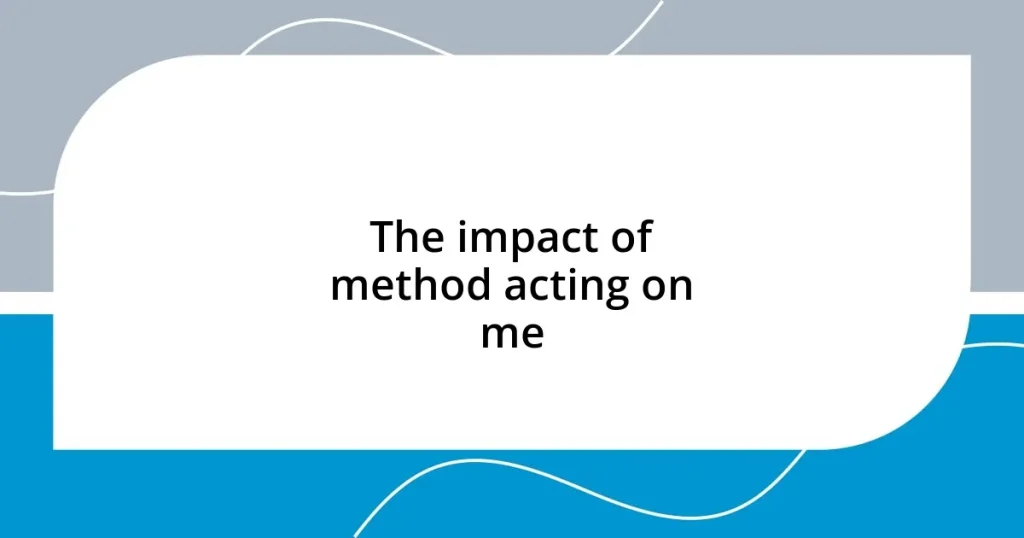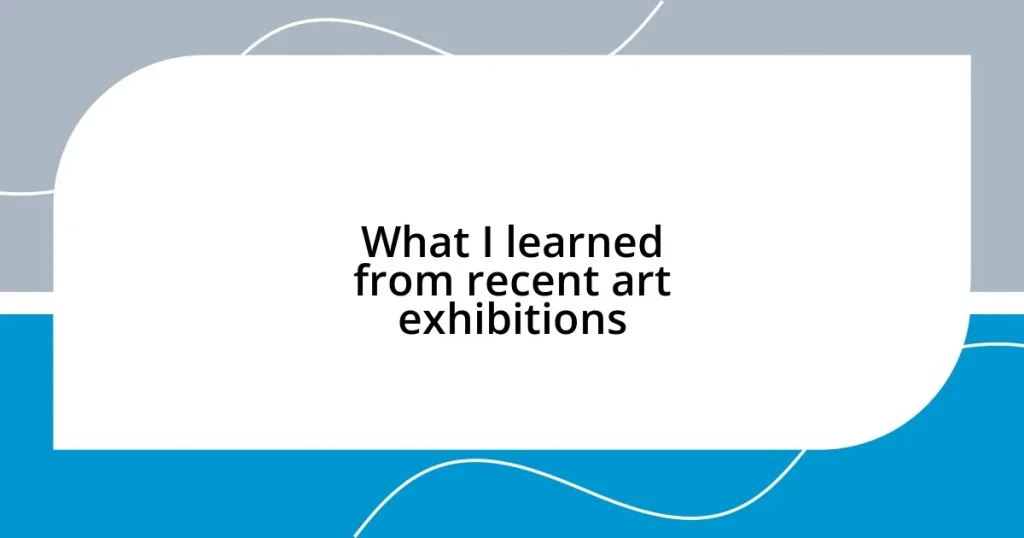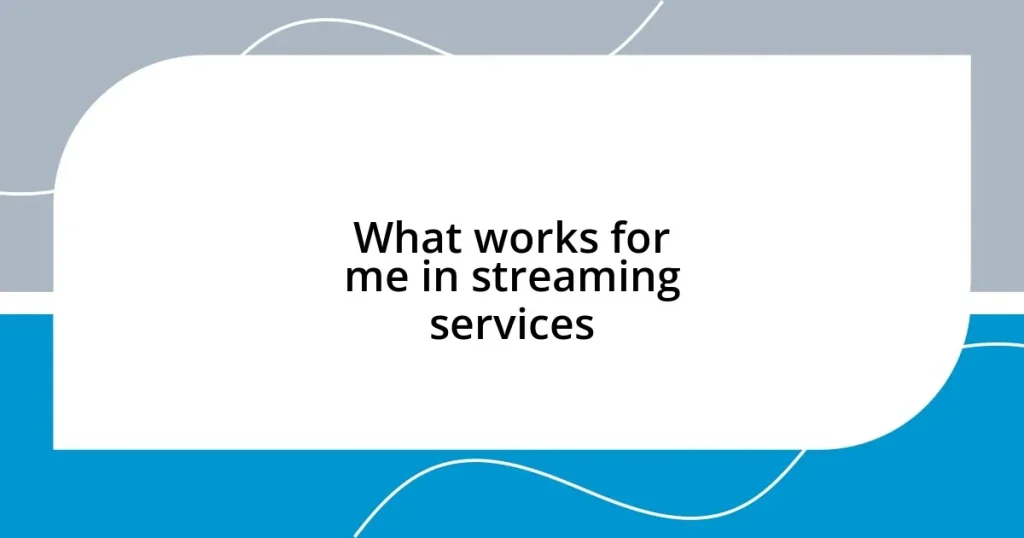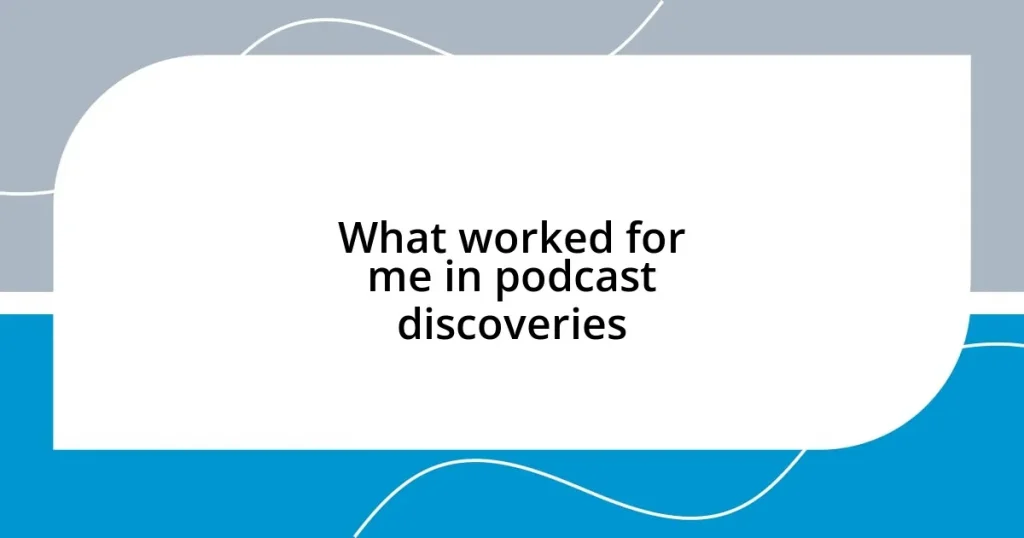Key takeaways:
- Method acting techniques, such as sensory memory and emotional recall, enhance authenticity by allowing actors to draw on personal experiences and genuine emotions.
- Emotional connection achieved through method acting fosters deeper audience engagement, creating shared experiences that resonate with viewers.
- While method acting promotes personal development and self-awareness, it can also present emotional challenges and requires careful balance to maintain mental health.
- Integrating method acting involves blending emotional exploration with technical skills, highlighting the importance of rituals and feedback for performance improvement.
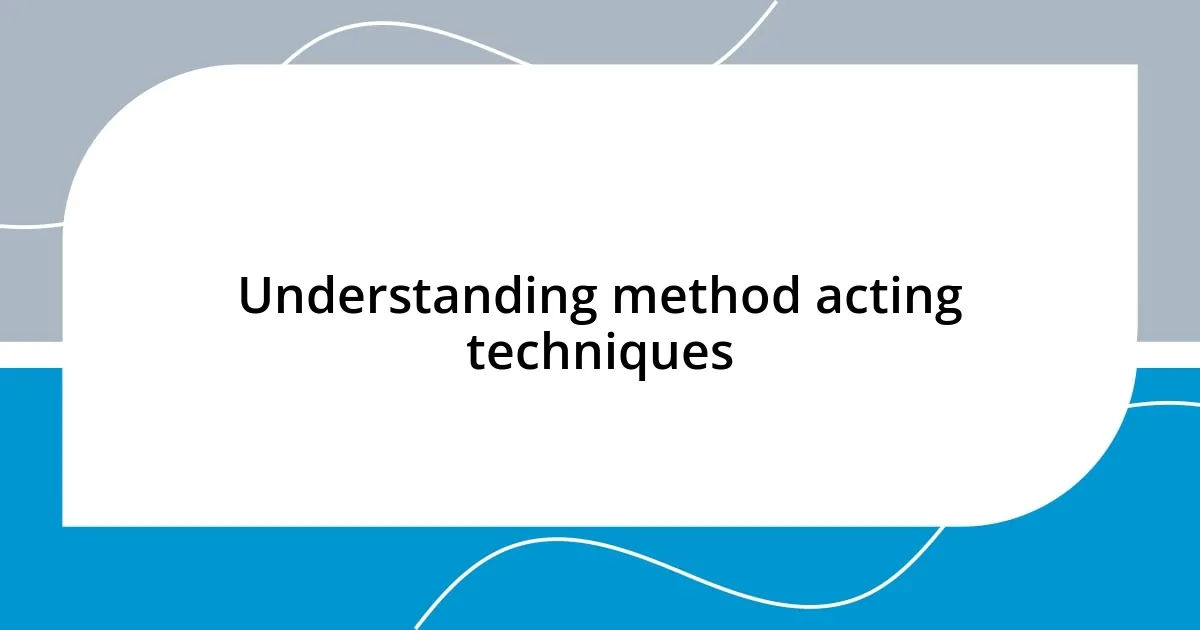
Understanding method acting techniques
Method acting techniques are deeply immersive, inviting actors to fully embody their characters by drawing on personal experiences and emotions. I remember the first time I tried to channel my own pain to portray a heartbroken character; it was both liberating and terrifying. Have you ever tapped into a memory that felt so raw, it transformed your performance in an unexpected way?
One significant aspect of method acting is the use of sensory memory. This involves recalling a specific sensation—like the smell of rain or the warmth of sunlight—to access genuine emotions. When I used this technique during a rehearsal, the simple act of remembering my favorite childhood spot under a tree made me feel nostalgia, which added layers to my portrayal. Isn’t it interesting how something as mundane as a smell can suddenly transport us back in time?
Another vital technique is emotional recall, where performers re-experience feelings from their own lives to mirror those of their character. I often find myself questioning how this approach influences my authenticity on stage. Does bringing our own emotions to the forefront create a deeper connection with the audience? I believe it does, as it allows for a vulnerability that resonates powerfully with viewers, creating a shared emotional landscape that is hard to forget.
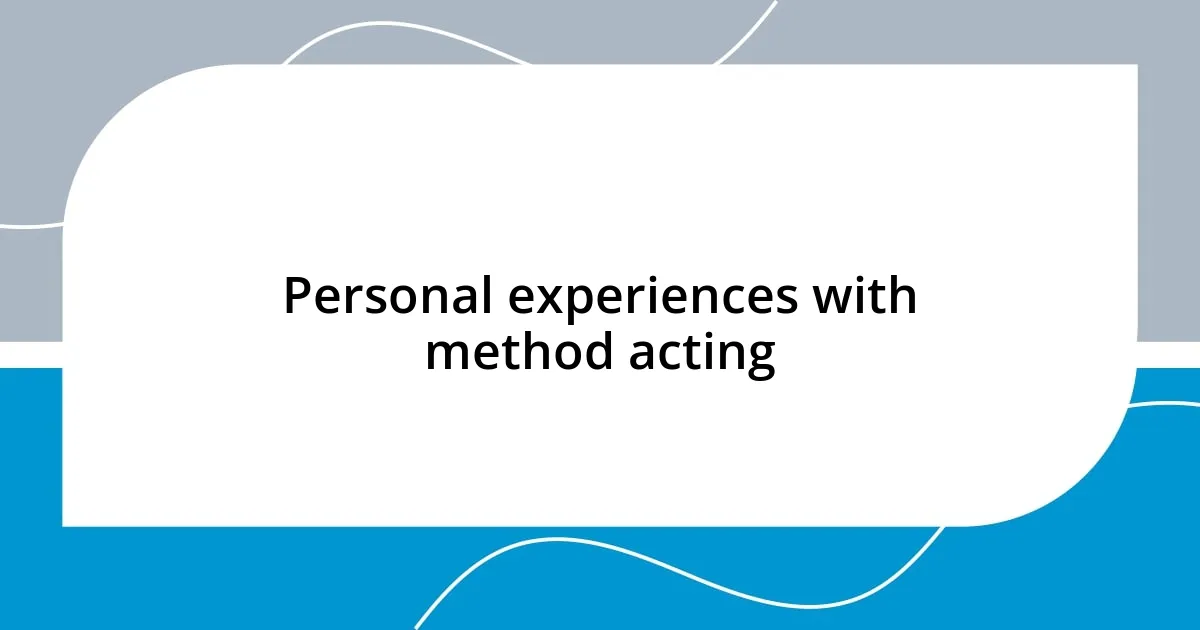
Personal experiences with method acting
Method acting has profoundly shaped my artistic journey, especially in how I connect with the characters I portray. I vividly recall a moment during rehearsals when I found myself lost in a particularly intense scene. I was playing a character grappling with loss, and I instinctively drew on a memory of my own family’s struggles. The flood of emotions that followed not only enhanced my performance but also left me breathless, making the experience unforgettable. Have you ever experienced a moment on stage that felt so genuinely real it altered your entire perspective on acting?
What truly astonished me was when I applied emotional recall for the first time while preparing for a passionate love scene. I decided to think about my first love, and as I delved into those memories, I felt a rush of exhilaration and heartache. It was as if time reversed, and I experienced those emotions anew. That exhilarating blend of vulnerability and raw energy not only made the scene more poignant but also reminded me why I fell in love with acting in the first place. It’s fascinating how revisiting our past can unlock powerful performances.
A slightly lighter moment also struck me while working on a comedic role. I aimed to bring out humor through authenticity, tapping into memories of family gatherings overflowing with laughter and spontaneous silliness. I found that embodying that joy helped me connect with my audience instantly, showcasing the notion that our personal histories can add a layer of depth to any character, even in comedy. Have you noticed how personal experiences can shift not only your performance but also the atmosphere around you?
| Technique | Personal Experience |
|---|---|
| Sensory memory | Recalling the scent of my grandmother’s cooking transported me to family dinners, enhancing my performance of a character longing for home. |
| Emotional recall | Dipping into my memories of heartbreak created an authenticity that resonated deeply during dramatic scenes. |
| Using humor | Channeling joyful memories from my childhood made a comedic performance feel more relatable and engaging. |
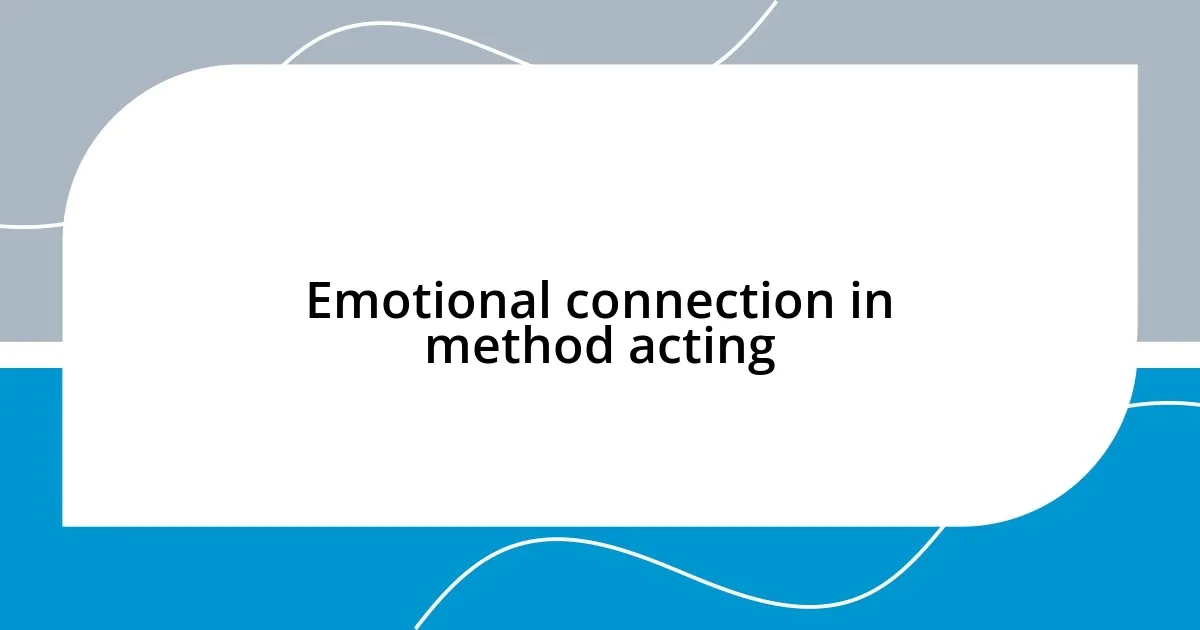
Emotional connection in method acting
I find that the emotional connection in method acting often leads to transformative moments both on and off the stage. For instance, I once portrayed a character facing betrayal, and in an effort to connect deeply with that feeling, I unearthed a personal memory of being let down by someone I trusted. Reliving that pain not only enriched my performance but also evoked a genuine sadness that my audience could sense. It’s remarkable how vulnerability, when shared through a character, can resonate with others in such profound ways, prompting them to reflect on their own experiences of loss.
Here are some core aspects of emotional connection in method acting:
- Personal Memory Exploration: Utilizing memories that stir strong emotions enhances authenticity, allowing the actor to convey genuine feelings.
- Vulnerability: Sharing personal strife or joy invites the audience to connect more deeply with the characters.
- Shared Emotions: When I allowed my own feelings to surface, it created a bridge between me and the audience, fostering empathy and connection.
Recently, while preparing for a complex role, I tackled a scene where my character faces a moral dilemma. I found myself recalling an incident from my teenage years when I had to make a difficult decision between loyalty and honesty. Tapping into that memory brought forth a wave of conflict and anxiety, which beautifully colored my performance. It struck me how our own emotional landscapes can serve as goldmines for character development, making each performance not just a portrayal, but a shared experience with those watching.
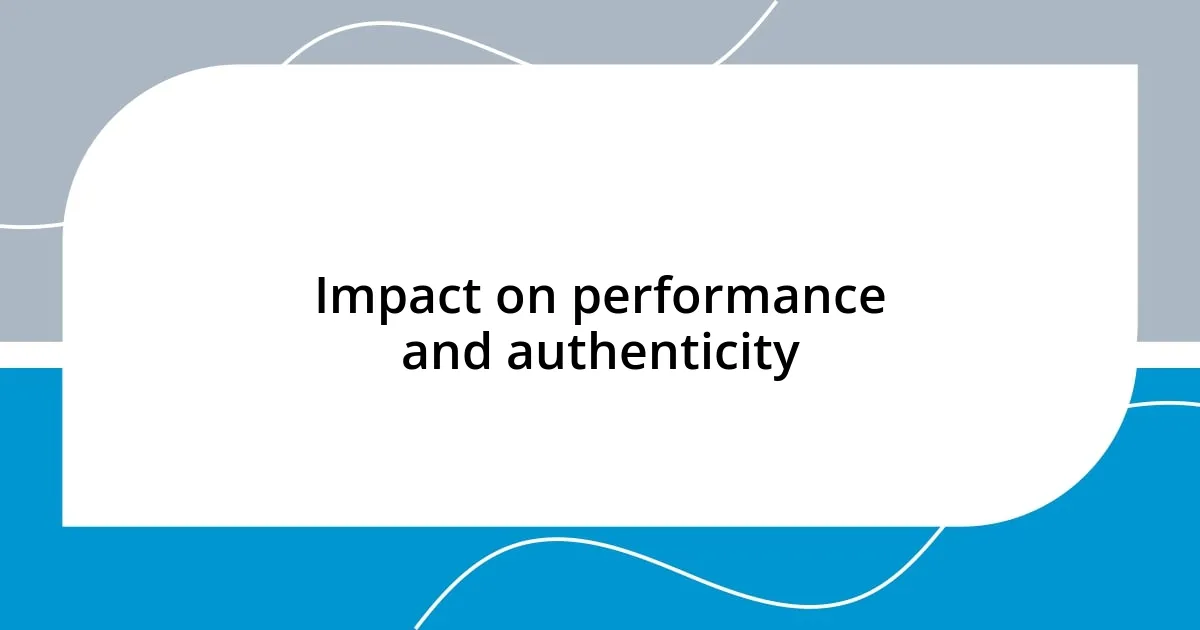
Impact on performance and authenticity
Method acting has a unique way of enhancing performance by grounding it in authenticity. I remember a moment when I was rehearsing a scene that required deep vulnerability. To embody my character’s despair, I chose to immerse myself in a memory of a time when I felt utterly defeated. That emotional groundwork allowed my performance to cut through the pretense and reach a raw, honest place, connecting with the audience on a level that words alone could never achieve. Have you felt how true emotional depth can transform a performance? It’s like peeling back layers to reveal something real underneath.
Interestingly, this approach isn’t limited to the heavy scenes. One time, while preparing for a jovial role, I recalled a family barbecue full of laughter and playful banter. Reliving those carefree moments infused my performance with a genuineness that made it more accessible to the audience. I often think about how we can often miss the power of simple, authentic moments in acting. When we draw upon personal experiences, it lends a certain warmth to our portrayals, making them resonate stronger with viewers.
I’ve also realized that the emotional recall technique, while powerful, requires a careful balance. There was an instance when I went too far into a painful memory for a dramatic scene. I tapped into grief that turned out to be overwhelming, almost leaving me unable to perform. This taught me that while authenticity is crucial, so is maintaining my emotional health. How do you balance pouring your heart into a role while also protecting yourself? This dance between authenticity and well-being is a continuous learning process that shapes my craft.
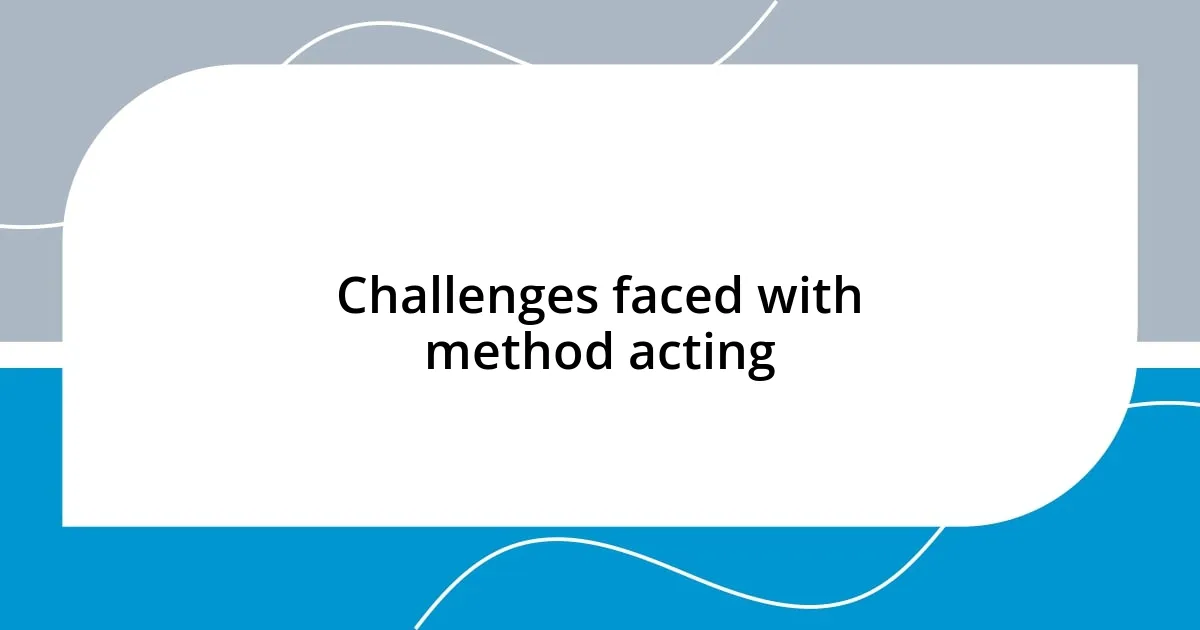
Challenges faced with method acting
Diving deep into method acting often comes with significant emotional challenges. I remember a time when I prepared for a role that required me to tap into a period of intense grief from my life. As I relived those memories each time I practiced, it felt like a weight bearing down on my chest, making it hard to separate my feelings from my character’s. Is this emotional immersion worth the cost to my mental health? The answer isn’t always straightforward.
Another hurdle I faced was the risk of becoming too absorbed in my character’s mindset, to the point where I struggled to switch off between rehearsals. I once found myself snapping at friends after a long day of embodying a particularly angry character, which startled me. Have you ever felt so wrapped up in a role that you lost sight of your real-life relationships? This experience taught me the importance of creating healthy boundaries, allowing myself to step back and recharge, so I can return to the character with fresh energy.
Additionally, there’s the challenge of audience perception. I distinctly remember performing a vulnerable scene where I felt incredibly connected to my character’s plight. However, I noticed some members of the audience seemed disengaged, probably unaware of the emotional journey I was undertaking. It raised a thought in my mind: How can we ensure our dedication resonates with our viewers? This ongoing dialogue between our internal efforts and external reception is a delicate balancing act. Each time I step on stage, I am reminded of the complexity and unpredictability inherent in the world of method acting.
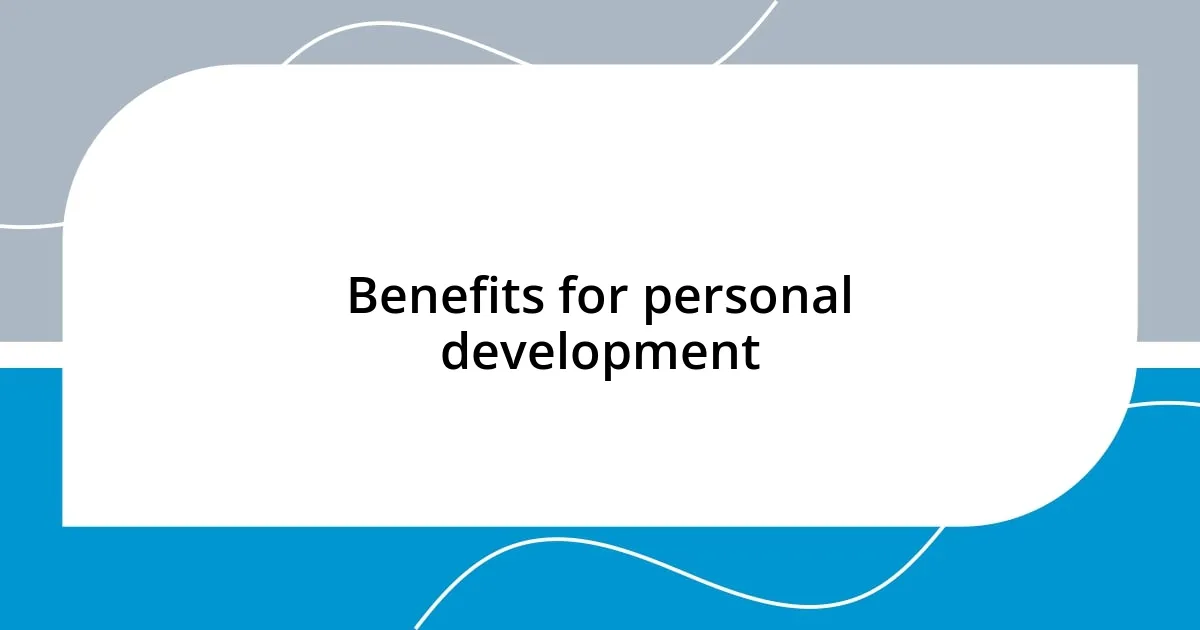
Benefits for personal development
Engaging in method acting has profoundly impacted my personal development. It has taught me the importance of emotional honesty—not just in performance, but in everyday life. There have been countless moments where I’ve found myself channeling my character’s emotions into real conversations, like when I expressed vulnerability to a friend inspired by a role’s experience. It sparked a deeper connection that led to meaningful discussions we might have otherwise avoided. Have you ever noticed how vulnerability can strengthen relationships?
Moreover, I’ve become more self-aware through this process. One time, during a rehearsal, I had to embody a fiercely ambitious character, and I realized just how much ambition drives my own life choices. By analyzing these portrayals, I’ve started to understand my motivations and fears on a deeper level. This self-discovery is a powerful tool; it helps me make intentional decisions that align with my values. It’s fascinating to think about how delving into fictional emotions can shine a light on our realities.
The transformative power of method acting has also prompted me to embrace new challenges. For instance, after stepping out of my comfort zone to fully inhabit an extroverted character, I surprised myself by initiating more social interactions in my daily life. This shift felt liberating, like shaking off an old skin. I often wonder, how many of us hold back from exploring our true potential? Method acting has encouraged me to push boundaries, reminding me that growth often lies just outside our comfort zones.
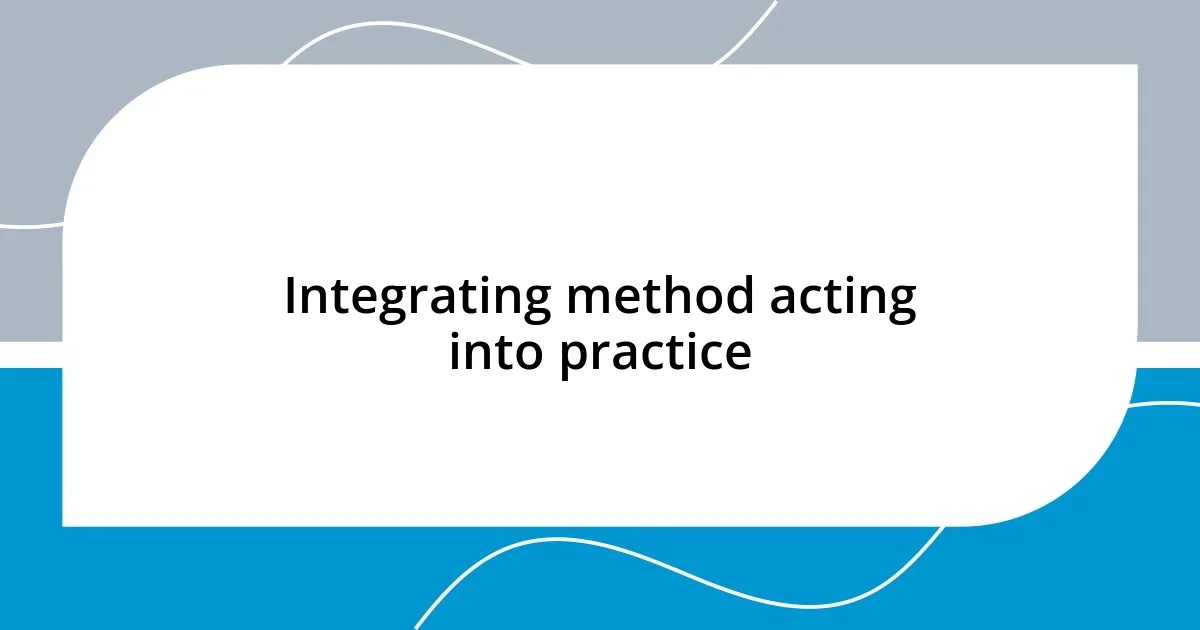
Integrating method acting into practice
Integrating method acting into practice involves a delicate blend of emotional exploration and technical skill. I recall a rehearsal where I truly immersed myself in my character’s trauma, and it felt as if I was walking a tightrope—each step was exhilarating yet terrifying. How do I balance the emotional depth required for the role while maintaining clarity in my performance? It was in that moment, feeling the vulnerability, that I realized the importance of staying grounded in reality even while pursuing the essence of a character.
One strategy I’ve found particularly helpful is developing rituals before performances. For instance, I often spend a few moments in silence, visualizing my character’s journey, which creates a tangible connection to the role. It might sound simple, but this practice transforms my mindset and helps me channel the character’s energy more authentically. Have you ever experienced how a small routine can set the tone for your entire day? That’s exactly the kind of impact these rituals have on my performances.
I’ve also learned the importance of feedback in this process. After an intense scene where I felt completely in tune with my character, I was surprised when a trusted peer pointed out areas that seemed disconnected. Initially, it stung to hear, but I realized that such insights are invaluable in shaping my development. It’s like looking into a funhouse mirror—sometimes, it distorts your view, but other times, it reveals parts of yourself you didn’t even know were there. How do we grow if we don’t embrace constructive criticism? Each rehearsal becomes an opportunity for both connection and self-discovery, guiding me toward a more nuanced understanding of my craft.











